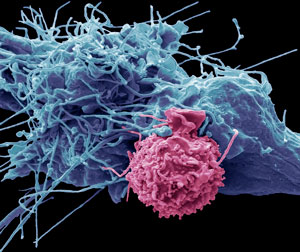Jun. 5, 2020 Research Highlight Biology
Chemokine renders immune cells less effective against cancer cells
A signaling molecule produced by the immune system hinders the immune cells from attacking cancer cells in mice
 Figure 1: A scanning electron micrograph showing a natural killer cell interacting with a cancer cell. Researchers at RIKEN have found that CCL5 produced by the immune system actually suppresses the action of immune cells such as natural killer cells against metastatic lung cancer cells.© STEVE GSCHMEISSNER/ SCIENCE PHOTO LIBRARY
Figure 1: A scanning electron micrograph showing a natural killer cell interacting with a cancer cell. Researchers at RIKEN have found that CCL5 produced by the immune system actually suppresses the action of immune cells such as natural killer cells against metastatic lung cancer cells.© STEVE GSCHMEISSNER/ SCIENCE PHOTO LIBRARY
In a surprising discovery, RIKEN researchers have found that preventing the immune system of mice from producing a small signaling molecule known as CCL5 actually helps the immune system to fight metastatic lung cancer1. This result highlights the pro-cancer role that CCL5 plays and promises to lead to new therapies.
CCL5 is a curious chemokine—a small protein secreted by cells that affects the immune system. For a start, it behaves differently from other chemokines. Most chemokines are quickly cranked out in response to a pathogen and then their levels drop off rapidly. In contrast, CCL5 is produced in small amounts even under normal conditions and it exhibits a double peak in response to a pathogen, with the second peak occurring a few days after the first one.
Also, the role CCL5 plays in cancer has been unclear. It is produced both by the immune system and cancer cells. The evidence has been mixed, with some studies finding it helps cancer cells flourish while others have found that it appears to help the immune system fight them.
Now, Ichiro Taniuchi and Wooseok Seo of the RIKEN Center for Integrative Medical Sciences and co-workers have shed light on both these aspects of CCL5.
 Wooseok Seo and co-workers have identified two enhancers for the gene that codes for the chemokine CCL5 and have shown that high levels of CCL5 reduce anti-tumor immunity by reducing immune cell function.© 2020 RIKEN
Wooseok Seo and co-workers have identified two enhancers for the gene that codes for the chemokine CCL5 and have shown that high levels of CCL5 reduce anti-tumor immunity by reducing immune cell function.© 2020 RIKEN
The team has identified two enhancers—short sections of DNA that, when combined with proteins known as transcription factors, enhance the transcription of an associated gene—that increase the production of CCL5. One of the enhancers is close to Ccl5, the gene that codes for CCL5, and it regulates production of the chemokine under normal conditions. The second enhancer is a long way from Ccl5 and it induces CCL5 expression in activated cells. Furthermore, the team found that the transcription factor RUNX suppresses the effect of these two enhancers.
But the biggest discovery was the role CCL5 plays in cancer. The researchers produced mice that lacked the enhancer close to Ccl5 and observed how they fared when injected with melanoma cells. They found that the mice lacking Ccl5 enhancer had fewer and smaller tumorous flecks in their lungs than normal mice. This shows that CCL5 produced by the first enhancer helps cancer cells to multiply. “This indicates that high levels of CCL5 are not good for the tumor immunity,” says Taniuchi.
The reason for this effect is because CCL5 suppresses the function of immune cells, which is why tumor cells produce the chemokine.
This finding could help realize new immunotherapies for cancer. “Our discovery suggests that if we can somehow remove CCL5 from our system, we may actually strengthen our immune system, which could help it better fight cancer,” adds Seo.
Related contents
- Helper T-cell development entails sophisticated interplay between enhancers and repressors
- Protein sustains immune cells involved in allergic reactions
References
- 1. Seo, W., Shimizu, K., Kojo, S., Okeke, A., Kohwi-Shigematsu, T., Fujii, S. & Taniuchi, I. Runx-mediated regulation of CCL5 via antagonizing two enhancers influences immune cell function and anti-tumor immunity. Nature Communications 11, 1562 (2020). doi: 10.1038/s41467-020-15375-w
